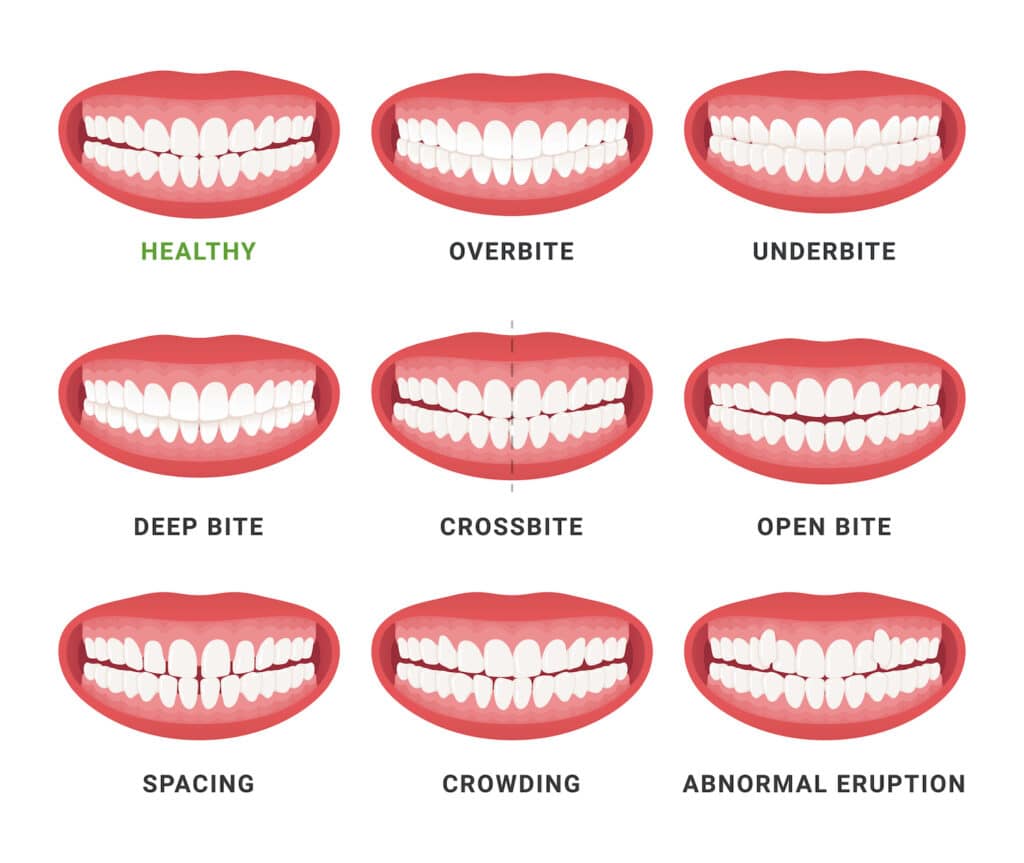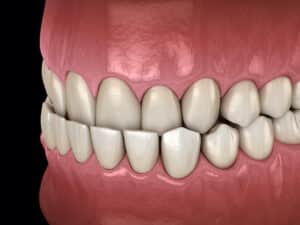Do your bottom teeth overlap your top teeth? If so, you probably have an underbite. You might be wondering how common an underbite is, or whether it can or should be corrected. Let’s take a closer look at underbites and what you can do about them.
What is an Underbite?

An underbite is a general term used to describe the state of the lower teeth protruding over the top teeth. In dentistry, an underbite is considered a Class III malocclusion. A malocclusion categorizes a variety of different teeth misalignments and malformations. So, when teeth don’t align properly or comfortably, or if teeth appear in unusual positions, these are different types of malocclusions. When the teeth in your lower jaw overlap the teeth in your upper jaw, your teeth generally won’t align comfortably, so this is a malocclusion.
Underbites can vary in their severity. A pronounced type of underbite called prognathism occurs when the lower jaw is positioned ahead of the upper jaw. In other types of underbites, the lower teeth might protrude slightly ahead of the upper teeth, while the position of the jaw is only slightly misaligned.
What Causes an Underbite?
An underbite can be caused by a number of factors. Underbites appear in early childhood when a child’s teeth and jaws are developing. In some cases, underbites are genetic. In other cases, underbites may be the result of, or occur alongside, developmental disorders or diseases. Underbites might also be caused by certain oral and myofunctional habits during early childhood, such as tongue thrusting, mouth breathing, teeth grinding, thumb sucking, and prolonged pacifier use. An underbite might also be caused by an injury, illness, or tumors that affects the position of the jaw.
An underbite can appear in a variety of ways, and it can be caused by a variety of different things. Here’s an overview of the causes of an underbite:
- Genetics
- Developmental disorders or diseases
- Early childhood tongue thrusting, mouth breathing, thumb sucking etc.
- Injury
- Illness
- Tumors
Are Underbites Harmful?

Underbites can be harmful if they are severe. The teeth won’t align properly, which can damage the tooth enamel. It can also make it harder to speak or chew comfortably. Since the jaw juts forward, it can also affect your appearance.
It can be difficult to tell whether or not an underbite should be corrected, especially early on. However, this is also the easiest time to correct an underbite, since a child’s teeth and jaws are more flexible. If a child has an underbite, parents might ask their family dentist or orthodontist whether or not the underbite is likely to affect the child later in life.
Can Underbites Be Corrected?
For many years, underbites could not be corrected, and those with underbites simply had to live with them. However, orthodontic treatments can correct underbites today. In some cases, orthodontic treatments are necessary to chew and speak comfortably. In other cases, an underbite might not be severe enough to affect your chewing or speaking, and you might not need to change it.
If your underbite affects your chewing, speaking, or your appearance in an uncomfortable way, orthodontic treatments can help.
- Braces or invisible trays: Braces or invisible alignment trays, like Invisalign, can help to correct minor underbites as they correct the spacing and position of teeth.
- Headgear: Headgear can help to pull the lower jaw backward, move the upper jaw forward or otherwise correct the jaw alignment.
- Expander: In some cases, the upper jaw is too small, and an expander can correct the alignment of the upper and lower jaw.
- Surgery: For severe underbites, surgery can move the lower jaw back and into proper alignment.
Underbites are not always problematic. If you have an underbite, but it doesn’t affect your day to day life, don’t worry about it! But, if you are concerned about your child’s underbite, or your own, orthodontic treatments can help. Make an appointment with a BDG dentist today to learn more about underbite treatment options for you or your child.
